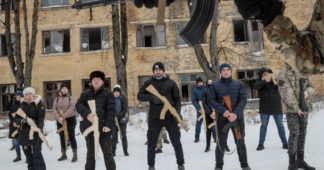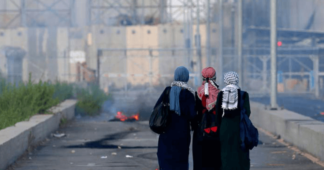At first they were seen as a fringe right-wing organization that was liable to take the law into its hands. Today they are so strong that the state may put the law into their hands. Who are Israel’s ‘new guardians’ and what do they want?
By Hilo Glazer
An almost palpable darkness covers Lahav Forest in the Negev. The only light comes from Rimon Farm, a project for at-risk youth. Inside a hut overlooking the farm, cookies, oranges and hot drinks are laid out on a table. The refreshments are for the jeep unit and other volunteers of Hashomer Hachadash (the new guardian in Hebrew). They’re preparing for action in the depths of the forest. The operation’s commander is standing with his back to a plasma screen that shows a map of the area. He begins his briefing by mentioning recent incidents: people trying out guns, illegal sales of combat weapons, the axing of pine trees, the deliberate destruction of crops, the torching of picnic tables. The group appears to be deploying for a tense night in a forest teeming with violence and crime.
The aim of the forces is to “create a presence,” the commander says. In the event of an encounter, the unit is to contact the local police and not “thrust to engage.” After all, this operational force – which consists of neither police officers nor members of the Civil Guard – has no real policing powers. That’s not to say it doesn’t work closely with the police. This month, in the wake of the wave of terror attacks around the country, Prime Minister Naftali Bennett declared his intention to establish an armed force of civilians – a national guard – that might be based in part on the infrastructure developed by Hashomer Hachadash.
And a considerable infrastructure does exist. In the 15 years since the group was founded – with the aim of helping farmers cope with harassment, looting and other violence – Hashomer Hachadash has grown into a genuine empire. It boasts 400 paid employees, tens of thousands of volunteers, a youth movement of 24,000, four agricultural schools, 300 cadets doing national service (instead of regular military service), and a core group associated with the Israel Defense Forces’ Nahal Brigade (combining military and civilian service). The organization has a budget of 82 million shekels (about $24 million) and receives generous government support. Indeed, of all the organizations in Israel that run educational programs, Hashomer Hachadash is in first place in terms of state funding. And equally important, it’s popular with (Jewish) politicians across the political spectrum.
Continue reading at archive.ph
We remind our readers that publication of articles on our site does not mean that we agree with what is written. Our policy is to publish anything which we consider of interest, so as to assist our readers in forming their opinions. Sometimes we even publish articles with which we totally disagree, since we believe it is important for our readers to be informed on as wide a spectrum of views as possible.











